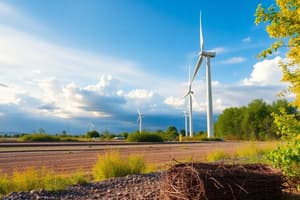Podcast
Questions and Answers
What is one consequence of dumping rubbish in landfills?
What is one consequence of dumping rubbish in landfills?
- It becomes a breeding ground for pests. (correct)
- It generates energy from waste.
- It helps to improve soil quality.
- It creates a natural habitat for animals.
Which of the following is a method to reduce land pollution?
Which of the following is a method to reduce land pollution?
- Ignore littering.
- Dump rubbish in nearby rivers.
- Burn rubbish openly.
- Dispose rubbish properly. (correct)
What is a major cause of water pollution?
What is a major cause of water pollution?
- Soil erosion. (correct)
- Using natural fertilizers.
- Planting trees near water bodies.
- Walking along riverbanks.
Which pollutant is primarily released from vehicles?
Which pollutant is primarily released from vehicles?
What does conserving natural resources imply?
What does conserving natural resources imply?
What is one way to reduce air pollution?
What is one way to reduce air pollution?
Which of the following is an example of reusing?
Which of the following is an example of reusing?
What does the 'reduce' principle mean?
What does the 'reduce' principle mean?
Which of the following materials is commonly recycled?
Which of the following materials is commonly recycled?
What is an effect of oil spills?
What is an effect of oil spills?
What is a consequence of soil erosion?
What is a consequence of soil erosion?
How can individuals contribute to reducing air pollution?
How can individuals contribute to reducing air pollution?
Which action does not promote the conservation of natural resources?
Which action does not promote the conservation of natural resources?
What is one way to properly dispose of rubbish?
What is one way to properly dispose of rubbish?
What does recycling primarily involve?
What does recycling primarily involve?
What is a harmful effect of littering?
What is a harmful effect of littering?
Which of the following is a method to reduce water pollution?
Which of the following is a method to reduce water pollution?
What is a direct result of burning rubbish?
What is a direct result of burning rubbish?
Which principle focuses on minimizing consumption?
Which principle focuses on minimizing consumption?
What is one way to reuse materials?
What is one way to reuse materials?
Study Notes
Land Pollution
- Landfills are a breeding ground for pests, which can spread diseases.
- Littering and dumping rubbish makes the environment look dirty and ugly.
Water Pollution
- Soil erosion causes water pollution.
- Dumping rubbish in rivers and lakes is a cause of water pollution.
- Releasing waste such as sewage water into rivers and lakes causes water pollution.
- Oil spills from ships and oil rigs cause water pollution.
Air Pollution
- Harmful gases released into the air make it unhealthy to breathe.
- Cars, trucks, buses, power stations, factories and burning rubbish release gases that pollute the air.
Conserving the Environment
- Conserving the environment means protecting it from harm and keeping it healthy.
- This includes using natural resources wisely and not wasting them.
Reducing Land Pollution
- Dispose of rubbish properly, do not litter.
- Participate in cleaning campaigns.
Reducing Water Pollution
- Do not throw rubbish in rivers.
- Clean sewage water at a treatment plant.
- Avoid cutting or burning trees to prevent soil erosion and muddy water.
Reducing Air Pollution
- Walk or ride a bicycle instead of driving a car.
- Share car rides (carpool).
Conserving Natural Resources
- Coals, gas and oil are finite resources and need to be used wisely so they are available for future generations.
The 3Rs
- Reduce, reuse, recycle.
Reduce
- Reduce paper use by writing on both sides.
- Bring your own shopping bags to reduce plastic bag use.
- Reduce electricity use to conserve fuels like oil, coal, and gas.
Reuse
- Use old things again instead of throwing them away. Examples include using a cardboard box to store toys, old tires as swings, glass jars as flower vases, and plastic bottles as pencil holders.
Recycle
- Use old things to make new things.
- Recycle materials such as paper, glass, plastic, rubber, and metal.
Land Pollution
- Landfills are breeding grounds for pests.
- Pests from landfills can spread diseases.
- Littering and dumping trash make the environment look dirty and unattractive.
Water Pollution
- Soil erosion contributes to water pollution.
- Dumping trash in rivers and lakes pollutes the water.
- Releasing sewage into rivers and lakes pollutes the water.
- Oil spills from ships and oil rigs cause water pollution.
Air Pollution
- Harmful gases released into the air make it unhealthy to breathe.
- Cars, trucks, buses, power stations, factories, and burning trash all release harmful gases.
Conserving the Environment
- Protection from harm and maintaining health are key aspects of environmental conservation.
- Using natural resources wisely and avoiding waste are crucial for protecting the environment.
Reducing Land Pollution
- Dispose of trash properly.
- Avoid littering.
- Participate in cleaning campaigns.
Reducing Water Pollution
- Do not throw trash into rivers.
- Treat sewage water at a plant.
- Avoid cutting or burning trees to prevent soil erosion and muddy water.
Reducing Air Pollution
- Walk or ride a bicycle instead of driving.
- Share car rides (carpool).
Conserving Natural Resources
- Coal, gas, and oil are finite resources.
- Using them wisely ensures their availability in the future.
The 3 Rs: Reduce, Reuse, Recycle
Reduce
- Reduce paper use by writing on both sides.
- Bring reusable shopping bags to reduce plastic bag usage.
- Conserve electricity to reduce the use of fuels like oil, coal, and gas.
Reuse
- Use old items again instead of throwing them away.
- Reuse cardboard boxes to store toys.
- Reuse old tires as swings.
- Reuse glass jars as vases.
- Reuse plastic bottles as pencil holders.
Recycle
- Use old things to make new products.
- Recycle materials like paper, glass, plastic, rubber, and metal.
Studying That Suits You
Use AI to generate personalized quizzes and flashcards to suit your learning preferences.
Related Documents
Description
This quiz covers the various types of pollution including land, water, and air pollution, highlighting their causes and effects. Additionally, it discusses the importance of conserving the environment and methods to reduce pollution. Test your knowledge on how to protect our planet from pollution.




